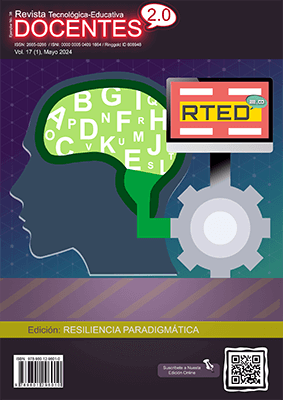Scientific Society of Students in Private University: For the Promotion of Scientific Research
 DOI:
https://doi.org/10.37843/rted.v17i1.478
DOI:
https://doi.org/10.37843/rted.v17i1.478
Main Article Content
Abstract
Every scientific society formed by students from private universities should be a research promoter. The objective of the present study was to identify the characteristics and importance of research groups of students from private universities. The positivist paradigm, deductive method, quantitative approach, non-experimental design, descriptive type, and cross-sectional research methodology were used in this work. Electronic surveys were applied, and a non-probabilistic sample was used. Among the most relevant findings, we have that students consider the training processes in research-related topics to be primordial; they also express the importance of the publication of systematic articles by the student population. It is concluded that in La Paz, there are few or nonexistent scientific societies in the framework of private higher education, which are an opportunity to create professional and inter-institutional links that support knowledge management. It is advisable to finance initiatives that support students with easy and practical exploration processes so that they receive permanent guidance from research institutions.
Downloads
Metrics
Article Details

This work is licensed under a Creative Commons Attribution-NonCommercial-NoDerivatives 4.0 International License.
Those authors who have publications in our journal accept the following terms:
- When a work is accepted for publication, the author retains rights of reproduction, distribution of his/her article for exploitation in all countries of the world in the format provided by our magazine and any other magnetic medium, optical, and digital.
- Authors will retain their copyright and guarantee the journal the right first to publish their work, which will be simultaneously subject to the Creative Commons Acknowledgment License (Attribution-NonCommercial-NoDerivatives 4.0 International (CC BY-NC-ND 4.0)). That allows third parties to copy and redistribute the material in any medium or format, under the following conditions: Acknowledgment - You must properly acknowledge authorship, provide a link to the license, and indicate if any changes have been made. You may do so in any reasonable way, but not in a way that suggests you have the licensor's endorsement or receive it for your use. NonCommercial - You may not use the material for a commercial purpose. NoDerivatives - If you remix, transform, or build from the material, you cannot broadcast the modified material. There are no additional restrictions - You cannot apply legal terms or technological measures that legally restrict you from doing what the license allows.
- Authors may adopt other non-exclusive license agreements to distribute the published version of the work (e.g., deposit it in an institutional archive or publish it in a monographic volume) provided that the initial publication in this journal is indicated.
- Authors are allowed and recommended to disseminate their work through the Internet (e.g., in institutional telematic archives, repositories, libraries, or their website), producing exciting exchanges and increasing the published work's citations.
- Request of withdrawal an article has to be done in writing by the author to the Editor, becoming effective after a written response from the Editor. For this purpose, the author or authors will send correspondence via e-mail: [email protected].
- The author will not receive financial compensation for the publication of his work.
- All Docentes 2.0 Journal publications are under the Open Journal System (OJS) platform at: https://ojs.docentes20.com/.
References
Aveiro Róbalo, T., Escobar Salinas, J., Ayala Servin, J., & RotelaFisch, V. (2019). Importancia de las sociedades científicas de estudiantes de medicina en Latinoamérica. http://dx.doi.org/10.22201/facmed.20075057e.2019.29.1761 DOI: https://doi.org/10.22201/facmed.20075057e.2019.29.1761
Bendezú Quispe, G., Hurtado Horta, S., Medina Saravia, C. E., & Aguilar León, P. (2015). Apreciación sobre capacitación en investigación y publicación científica en estudiantes universitarios. Investigación en educación médica, 4(13), 50-51. https://n9.cl/500nw DOI: https://doi.org/10.1016/S2007-5057(15)72169-1
Cáceres Castellanos, G. (2014). La importancia de publicar los resultados de Investigación. Revista Facultad de Ingeniería, 23 (37), 7-8. https://n9.cl/927he DOI: https://doi.org/10.19053/01211129.2795
Cayo Rojas, C., & Agramonte Rosell, R. (2020). Desafíos de la educación virtual en Odontología en tiempos de pandemia COVID-19. Rev Cubana Estomatol, 57(3), 3341. https://n9.cl/6ksm6
Crespo Ayala, P. E. (2019). Guía didáctica de Estadística descriptiva. Instituto Superior Tecnológico Ismael Pérez Pazmiño.
Escobar-Salinas, J. S., & Ayala Servín, N. (2017). The role of scientific student societies in Paraguay. Medwave. DOI: https://doi.org/10.5867/medwave.2017.04.6962
Flores L. A., & Salvatierra, N. L. (2017). Realidad de la Investigación en la Escuela de Medicina de la Universidad Nacional de Trujillo. https://n9.cl/l70oe
Gonfiantini, V. (2023) Investigar. https://n9.cl/11pc8
Gutiérrez Cirlos C., Naveja, J. J., & Sánchez-Mendiola, M. (2017) Factores relacionados con la elección de especialidad en medicina. Inv Ed Med. DOI: https://doi.org/10.24875/GMM.17002959
Mayta-Tristan P., Cartagena-Klein, R., Pereyra-Elías, R., Portillo, A., & Rodríguez-Morales, A. J. (2013). Apreciación de estudiantes de medicina latinoamericanos sobre la capacitación universitaria en investigación científica. RevMed Chile. DOI: https://doi.org/10.4067/S0034-98872013000600005
Miranda Beltrán, S., & Ortiz Bernal, J. A. (2020). Los paradigmas de la investigación: un acercamiento teórico para reflexionar desde el campo de la investigación educativa. RIDE. Revista Iberoamericana para la Investigación y el Desarrollo Educativo, 11(21), e064. https://doi.org/10.23913/ride.v11i21.717 DOI: https://doi.org/10.23913/ride.v11i21.717
Reyes-Rodríguez, Y., & Concepción-Pérez, E. (2022). Estrategia Pedagógica para Desarrollar Competencias Investigativas en los Docentes de Ciencias Médicas. Revista Tecnológica-Educativa Docentes 2.0, 14(2), 15-21. https://doi.org/10.37843/rted.v14i2.301 DOI: https://doi.org/10.37843/rted.v14i2.301
Salamanca-Kacic, A. (2021). Estrategias Neurodidácticas de Enseñanza Aprendizaje para la Investigación Jurídica. Revista Tecnológica-Educativa Docentes 2.0, 11(1), 11-18. https://doi.org/10.37843/rted.v11i1.142 DOI: https://doi.org/10.37843/rted.v11i1.142
Taype-Rondan, A., Huaccho-Rojas, J., & Guzmán, L. (2011). Sociedades científicas de estudiantes de medicina en el Perú: situación actual y perspectivas futuras. CIMEL






